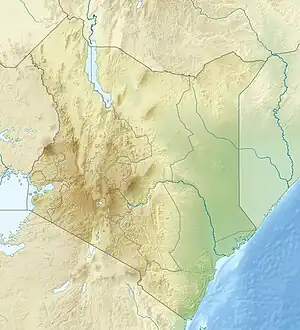| Matthews Range | |
|---|---|
| Lenkiyio Hills | |
 Location | |
| Highest point | |
| Peak | Warges |
| Elevation | 2,688 m (8,819 ft) |
| Dimensions | |
| Length | 150 km (93 mi) N/S |
| Width | 40 km (25 mi) E/W |
| Geography | |
| Country | Kenya |
| Range coordinates | 1°15′N 37°15′E / 1.250°N 37.250°E |
The Matthews (or Mathews) Range, also known as the Lenkiyio Hills, is a range of mountains in Kenya.
History
Originally gazetted in 1956, the Matthews Range was designated in 1964 as a forest reserve status.
In 1995, a Trust was formed by the Samburu tribes to preserve the Namunyak Wildlife Conservacy, which remains one of the most successful community conservation programs in Kenya.
Geography
The range is about 150 km long, oriented north–south. It is located in the Laikipia district of the Rift Valley Province in northern Kenya. The town of Wamba lies at the southeastern edge of the range.[1]
Peaks
The highest point is Warges, at 2,688 metres (8,819 ft) above sea level, a peak located the southern end of the range, separated by a valley from the rest of the range.[2] There is also a breast-shaped hill locally known as Sweet Sixteen in the range.[3]
Table
| Name | Elevation/Height above sea level | Notes |
|---|---|---|
| Ilmara Muroi | 1,289 metres (4,229 ft) | |
| Ilpisyon | 1,491 metres (4,892 ft) | |
| Ldoinyo Lenkiyo | 1,809 metres (5,935 ft) | |
| Lekat | 1,625 metres (5,331 ft) | |
| Lolgek | 1,184 metres (3,885 ft) | |
| Lomolok | 1,472 metres (4,829 ft) | |
| Mathews Peak | 1,890 metres (6,200 ft) | |
| Namanyaraboo | 1,216 metres (3,990 ft) | |
| Oldoinyo Sabachi | 1,963 metres (6,440 ft) | |
| Tipito | 1,861 metres (6,106 ft) | |
| Warges | 2,688 metres (8,819 ft) | |
Ecology
The area is isolated, and holds forests of juniper and cycads. It is home to elephants and other large mammals, and was one of the last places in northern Kenya to have wild Black Rhinos. The last Black Rhino in the Mathew's was poached out in the 1990s. The Mathew's are also home to the Samburu people. The mountain range is a sky island: surrounded by plains, with Ndoto Mountains to the north and the Karisia hills to the west. A number of the species in the Mathew's have evolved independently and the diversity of the forest is of great conservation value.[4] Part has been designated as a wildlife sanctuary.
References
- ↑ Rough Guide Map to Kenya
- ↑ "Warges". Mapcarta. Retrieved 18 September 2016.
- ↑ Africa: taking flight over Kenya's elephant country
- ↑ Peter Greste (14 July 2010). "Biological bonanza in Kenya's threatened forest". BBC News. BBC. Retrieved 14 July 2010.